Serendip is an independent site partnering with faculty at multiple colleges and universities around the world. Happy exploring!
Defining "Genre": A Graphic Paper

For this paper, I have played upon the genre of the "graphic narrative" in order to lay out my thoughts. (Haha, wasn't that puny?) Thinking about my call for a more structured definition of genre, I have thought about WHY it is important, rather than think of how it can't be done. As we've found, thinking about the "how" seems to lead to dead ends.
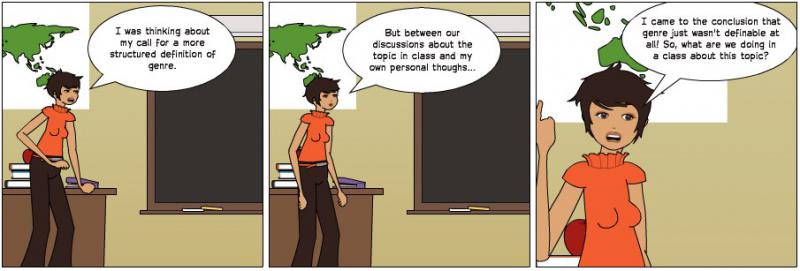
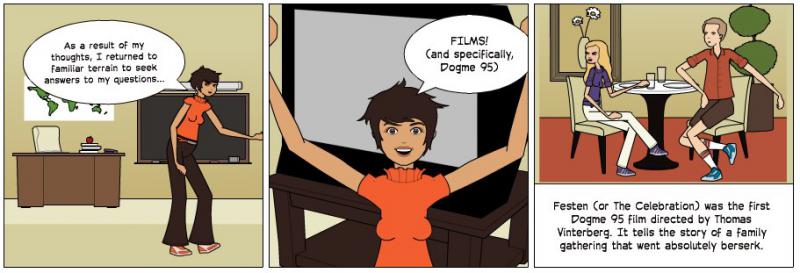
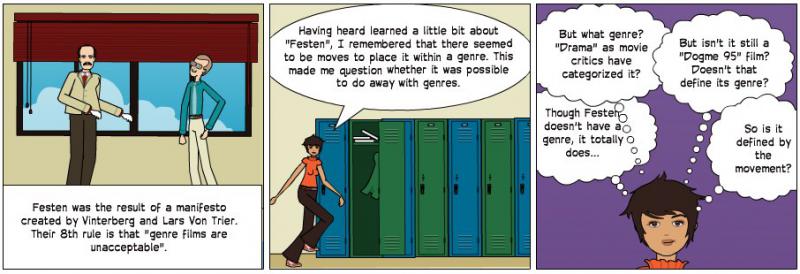
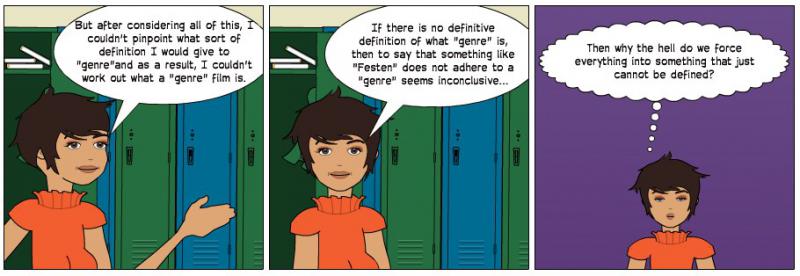
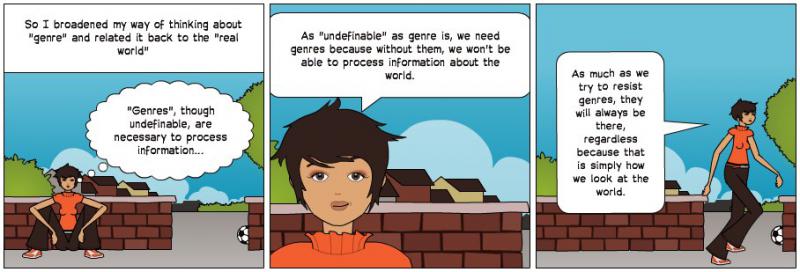
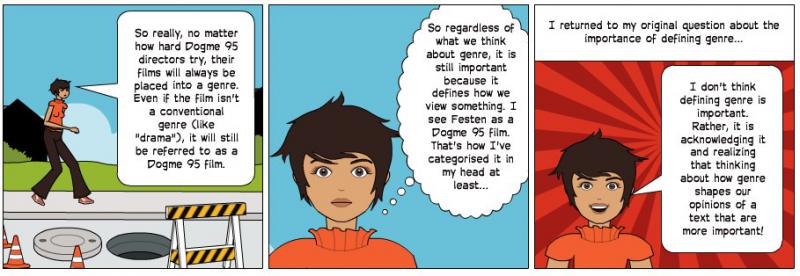
Resources Used:
http://cinetext.philo.at/reports/dogme_ct.html
http://www.imdb.com/title/tt0154420/
http://www.wolframalpha.com/entities/movies_genres/what_is_the_genre_of_festen%3F/7j/5s/by/
Festen. Dir. Thomas Vinterberg. 1998.
Groups:



Comments
Thanks for the response!
Those are some really interesting questions. Though, I do want to point out some of the limitations that I had working on this project. I used a site called "Pixton" which offers preset comic book layouts. I'm not too great an artist (actually, I'm pretty bad) so I figured that using this site would allow me to play around with the media format/delivery technology without frustrating myself. However, there were set characters, emotions and backgrounds which really limited my piece. So, it was a little bit difficult to avoid the manhole and the perky breasts. (I didn't cite the tool because I figured that it was a "tool" used in my making of the paper. I likened the citation of the website to citing my laptop and pen. Though I know that this gets us into murky water...)
In terms of the "illumination", I wanted the comic to read like the conversation that I had with myself about genre. I thought about having a clear thesis (as you are required to do while writing for the academy) but I found myself having a difficult time trying to get this nailed down. So I found myself writing down my thoughts in order as they came to me and I put it into the comic, frame-by-frame. I'm quite interested in that question of why the "how" (to create a genre definition) doesn't work - I don't think I meant to imply that it lead to a dead end (I can see how that came about) but that it was difficult to come to a conclusion.
I'm really interested in dglasser's "question of semantics" though. There are a lot of things that you signaled that did not occur to me as I was making the comic. The character leaving the room to think broadly was one and yes, the part where she sits was to symbolize how she was still boxed in. The red starburst at the end was used because, well, I couldn't think of how to have her back in the classroom logically and the red starburst was the prettiest thing I could find that could break the continuity of the piece. This leads me to pose a question of semantics however, how far should we read into a text?
Now to the "comparative media" part. I wanted to present this paper in images because I felt that it would symbolize how I've "moved forward" and beyond in my way of thinking. My character is also always moving and walking from place to place - I come up with a lot of thoughts while taking long walks. This entire thing was meant to show a "process" of coming up with a main point and all the thought processes I went through to get to my "final" statement. The form of an academic paper (where you present a point and defend it throughout) would just not reflect this.
However, I also can't help but think about the importance of images -- one that I definitely realized throughout the process of making this strip. Do the images distract from the content (that is, the point that I'm trying to make) of the piece? I can't help but (cheekily) point out that you began with an interpretation of the images rather than the content. I wonder why images take precedence - I definitely looked at the images before reading the text in Persepolis - and what that means in terms of presenting an idea in a media format that uses both text and image.
Playing with Genre
So of course the first thing I need to celebrate here (as I seem to do for all of your webevents, leamirella!) is your decision to play w/ yet another "genre," to place your meditations about the usefulness of 'genre categories'-- as a category--into the form of a web comic.
And of course your doing so raises, as always, the question just what this particular form gets you, how-and-why it matters in constructing your argument. What distracted me, first off, was the perky breasts of your spokeswoman. (What does that do to the argument?) What I appreciated, second, was the change in background, which I think you used well for emphasis. As your character begins to "broaden her way of thinking," and "relate it back to the real world," for example, she leaves the classroom, w/ its static map, and goes outside (though you still have her sitting beside a low wall...is that symbolic? Are you suggesting that she's still "boxed in" by generic conventions?) And what am I to make of the open manhole cover in frame #16? And what about the red starburst that backs your spokeswoman in the final frame? Does this mark a "real" illumination? How would your/her final insight (appear to) differ, if she returned to the classroom to deliver it? MIght that signal that it is more, well, as one of your classmates asked, "just a question of semantics?"
The perception that a refusal to make genre films is, de facto,creating a new ("non-generic") form is of course an important point --though I think you're ready (and I'd like you) to go a little further in thinking about the implications of this observation. If indeed we cannot do without genres, if we need them (as you claim, and as I agree) in order "to process information about the world," how exactly does that work? (In asking this question, I am of course signaling that I don't buy your initial move, the claim that "we've found that thinking about how leads to dead ends.")
Let's apply that question, in particular, to this project: what does presenting it in the genre of a web comic accomplish? How does it differ? How-and-why does it matter?
And of course I can't resist, in closing, from directing you to Scott McCloud's I can't stop thinking, which utterly refuses the page-based format you use here....what can of worms does THAT open up for your exploration here?? (See especially 10 Suggestions for First-Time WebComics Artists....)